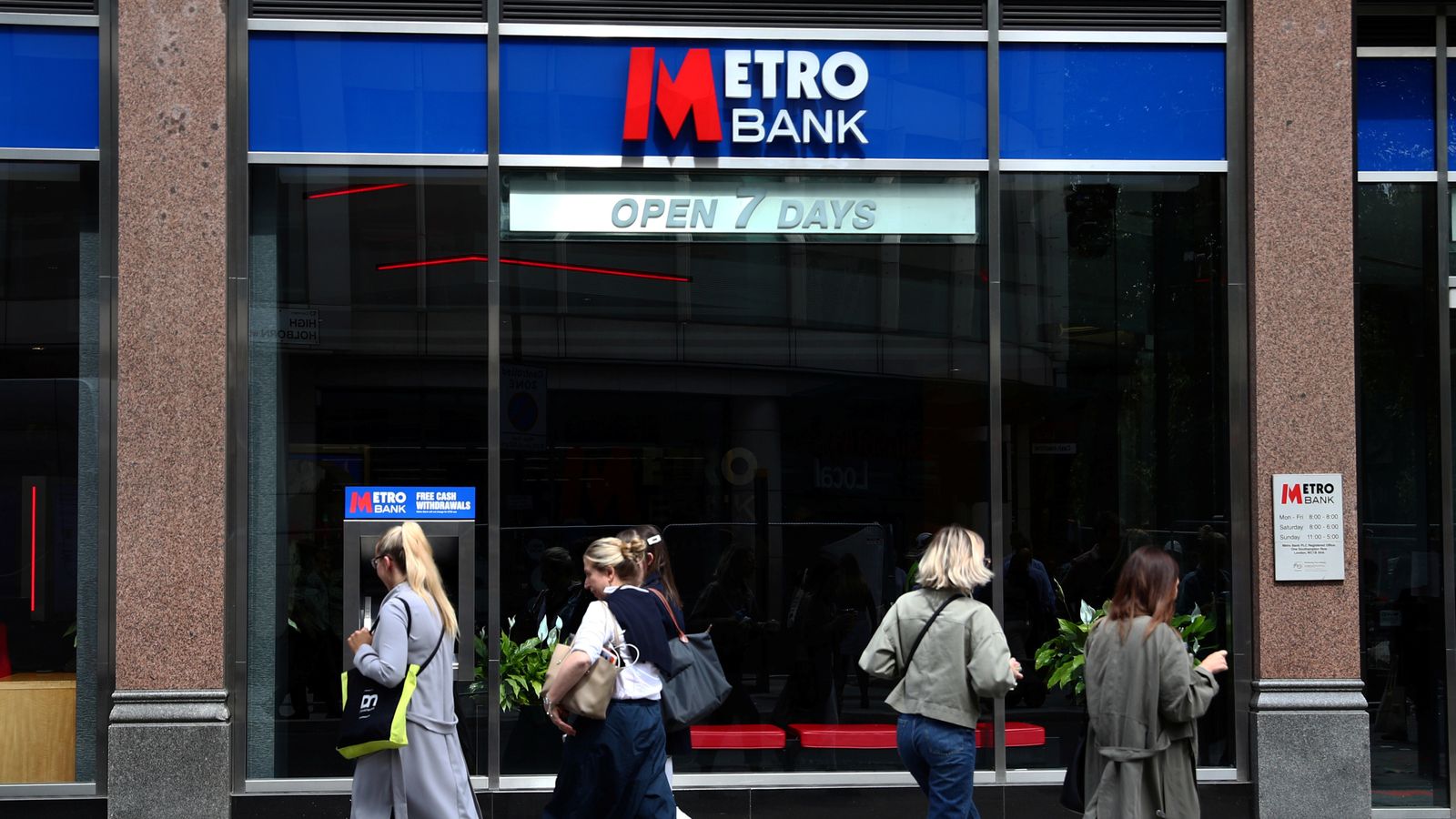Metro Bank, the high street lender, is drawing up plans to raise hundreds of millions of pounds of new capital in weeks in a bid to strengthen its troubled balance sheet.
Sky News has learnt that Metro Bank – the first new lender to open on Britain’s high streets in over 100 years when it launched in 2010 – is working with advisers to secure several hundred million pounds in new debt and equity.
City sources said on Wednesday evening that the company had hired bankers at Morgan Stanley to work on the capital-raising plans, while Moelis, another investment bank, is also thought to be involved.
Royal Bank of Canada, Metro Bank’s corporate broker, is also involved in the equity-raise.
Metro Bank’s board, which is chaired by Robert Sharpe, a veteran banker, is exploring a range of options to shore up its troubled balance sheet.
Read more
Banks warned on branch closures as access to cash to be ‘protected in law’
Banks accused of closing accounts belonging to British Muslims
A potential equity-raise of more than £100m is understood to be among them, although analysts and industry executives have cast doubt on its ability to deliver that following a precipitous fall in its share price.
Monzo banks on revamp to pave way for international expansion
City watchdog warns banks it will ‘act’ if politicians wrongly denied access to services
UBS to cut 3,000 jobs in Switzerland despite huge profits from takeover of Credit Suisse
Metro Bank has 2.7 million customer accounts, making it one of the 10 largest banks in Britain.
It offers current accounts, business accounts, personal loans and insurance products, and employs about 4,000 people, operating from about 75 branches across the country.
Shares in Metro Bank have halved during the last month to leave it with a market capitalisation of less than £100m, having been valued at about £3.5bn at its peak in 2018.
The company’s directors are also understood to be trying to raise roughly £200m of loss-absorbing capital known as MREL.
Metro Bank needs to refinance £350m of existing MREL debt which is due to expire this time next year.
Another alternative being considered would involve the sale of billions of pounds of mortgage assets, a move that would reduce its earnings but also sharply reduce the amount of capital it is forced to hold.
Further options could entail a debt-for-equity swap or an outright sale of the company.
In a statement issued to Sky News, a Metro Bank spokesman said: “As previously stated, Metro Bank continues to consider how best to optimise its capital resources to allow it to take advantage of the deposit and asset origination platform that has been built.”
Please use Chrome browser for a more accessible video player
On Wednesday evening, City insiders said that banking regulators and the Treasury were closely monitoring Metro Bank’s capital-raising plans.
While there is no suggestion that it is at risk of imminent collapse, rumours have circulated for years about its finances.
In 2019, customers formed sizeable queues at some of its branches after suggestions circulated on social media that it was in financial distress.
Days later, it unveiled a £350m share placing in a move designed to allay such concerns.
Be the first to get Breaking News
Install the Sky News app for free
News of Metro Bank’s efforts to secure a new capital injection comes weeks after it was dealt a severe blow by the Prudential Regulation Authority (PRA), which supervises British banks’ capital and solvency.
In mid-September, it announced to the London stock market that the PRA had informed it that it would not gain approval this year for an internal ratings-based model allowing it to hold less capital against its mortgage assets.
Metro Bank has had a chequered history with City regulators, despite its relatively brief existence.
Last December, it was fined £10m by the Financial Conduct Authority for publishing incorrect information to investors, while the PRA slapped it with a £5.4m penalty for similar infringements a year earlier.
The lender was founded in 2009 by Anthony Thompson, a financial services entrepreneur, and Vernon Hill, an American who eventually left in controversial circumstances in 2019.
Metro Bank has been forced to sell assets in the past, announcing a deal in December 2020 to sell a portfolio of owner-occupied residential mortgages to NatWest Group for up to £3.1bn.






















